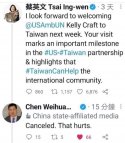Does that mean you don't subscribe to the view that China will invade at some point simply because Taiwan puts off unification discussions? That was one part of the anti-independence legislation that was passed some years ago. Is it in your mind possible that all of us on the forum could die before unification took place and it would be for the next generation to find a solution?
Whilst I think that urgent unification via military force isn't in China's interests - although I agree that if the ROC constitution is changed to show that Taiwan is a separate legal entity from China that would trigger an attack - I don't think that anyone can guess who will be Xi's successor or what their agenda will be. I remember being lectured by Chinese nationalists that the presidential term limits were a core part of the PRC's constitution and that the CCP would never allow them to be swept away easily - right up until Xi swept them away easily.
The PRC's 100 year anniversary is the biggest China will have yet. The president of China that retakes (and holds) Taiwan - especially before 2049 - will go down in PRC history and might well replace Mao as its top leader. For someone with an ego that might be a temptation too big to pass up.
I'm not sure what the age of us on the forum is lol.
That said, I'm sure that at some point China will deliver an ultimatum to Taiwan with the threat of military force but I can't see it happening within the next decade or so if China can help it. If you note in my previous post I was rather time specific.
As for the sweeping of presidential terms for the CCP; I don't think changing it was either easy or obvious. There were a set of rather unique domestic and more importantly external geopolitical factors at play which made the formalization of state power more sensible in that regard. Not to mention the role of president was always less important than general secretary, now the two are just both more in line with each other. But this is a completely different topic, so I'm sure you can appreciate why I won't go more into it and advise you to avoid it as well.
I also think you are missing the point of my previous post -- it was specifically to clarify why the statements of "China is willing to go to war over Taiwan today and can probably win, in event its red lines are crossed" is not incongruous with the idea of "China today does not want to go to war as its first option in solving the issue, and even if China had the option to go to war today, it probably wouldn't unless its red lines were crossed".
If you're talking about things over 2, 3, 4, decades down the line, who knows.
But my previous post was specifically addressing the current strategic rationale and what I believe the rationale will be for the immediate future (10-20 years ish). Whether there are any geopolitical developments that upend said strategic rationale is another issue -- never say never, after all.

